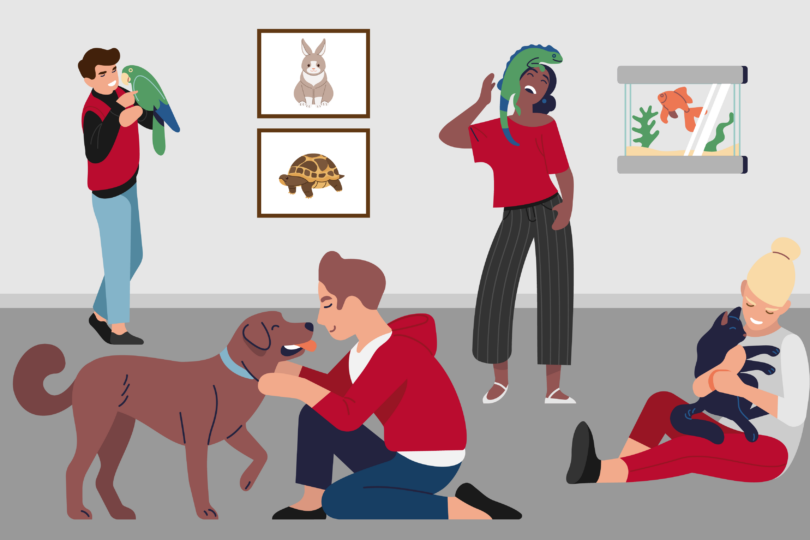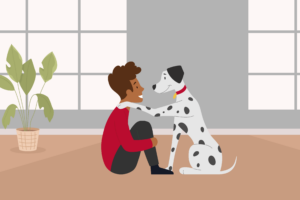You won’t find the words “dog” or “cat” on a prescription bottle, but research shows that having a pet can be effective medicine for improving mental and physical health.
Pets and Physical Health
In 2023, United States Surgeon General Dr. Vivek Murthy announced that an epidemic was on the rise, and it’s not the one you’re thinking of. Loneliness is a growing global condition that affects people of all ages and backgrounds. In fact, a study from the American Psychiatric Association found that one in 10 Americans say they feel lonely every day.
The U.S. Department of Health and Human Services reported that loneliness can lead to serious consequences in physical health including a:
- 29% increased risk of heart disease,
- 32% increased risk of stroke, and
- 50% increased risk of developing dementia for older adults.
A team of researchers from the University of Georgia and Brenau University, led by Dr. Sherry Sanderson, an associate professor and veterinarian in the College of Veterinary Medicine at the University of Georgia, recently completed a feasibility study exploring an unconventional—and adorable—solution to keep older adults healthy as they age.
The study addressed the needs of two vulnerable populations by pairing foster cats from the Athens Area Humane Society with adults aged 60 or older who were living alone and didn’t have any pets in order to learn more about the impact of the human-animal bond on mental and physical health.
“Older adults are a population at increased risk for loneliness and social isolation. A loss of family and friends, declining health, lack of transportation and financial stress all increase the chances of them becoming lonely as well as the adverse health effects associated with it,” Sanderson says. “The human animal bond is one way to help older adults and homeless cats simultaneously, so it is a win-win for both parties.”
So, how does having a pet increase physical health?
Many pets require regular exercise and playtime, which requires their owners to engage in consistent physical activity. Even low-maintenance pets like cats and birds need physical stimulation on a day-to-day basis. Research from the Mayo Clinic Health System shows that the additional exercise that comes from owning a pet can help:
- improve blood pressure,
- reduce obesity,
- strengthen joints,
- reduce blood sugar and
- increase aerobic capacity.
“Just the routine of taking care of a pet can motivate you to get up and do what you need to do,” says Sanderson. “When people are lonely or depressed, it can be hard to convince themselves to do anything. But if they know a pet depends on them, that can make a big difference.”
Pets and Mental Health
Numerous organizations are studying the relationship between pet ownership and mental health, including the National Institutes of Health, the Mental Health Foundation and the Human Animal Bond Research Institute. The general consensus is that pets make people healthier and happier but there are still a lot of questions about why and how.
A joint study between the Human Animal Bond Research Institute and the Mental Health Foundation showed that the answers might start on a chemical level. The research revealed that oxytocin levels increase in both pets and human beings when they interact with each other. Known as one of the “happy hormones” along with dopamine and serotonin, oxytocin can increase happiness and life satisfaction while reducing stress and depression.
“Pets can bring so much joy,” says Sanderson, who assessed different aspects of the human animal bond in her own study. “Of course, there’s a lot of time and effort involved in raising a pet, but the benefits outweigh any amount of work that’s associated with it.”
Sanderson has cats of her own and says that she never feels lonely once she arrives at home.
“There’s this little entourage of faces that are happy to see me. There’s always someone that wants affection and is happy just laying on my lap.”
Pets and Grief
Despite its obvious benefits, pet ownership, like any relationship, has its emotional struggles. The Bowen family systems theory is a concept that describes a family as a single emotional unit where the emotions and needs of one member affect everyone else in the family. Many researchers recognize pets as part of this system, which explains the strong bond between pet and pet owner.
Noelle Browning (LCSW), a licensed clinical social worker at UGA’s Veterinary Teaching Hospital, says that everyone in the family has a role, including the animals.
“In a way, they’re like toddlers,” says Browning. “As their caregivers, we’re constantly thinking about where they are, what they need and when to feed them. Like any caregiver-dependent relationship, this creates a bond, whether it’s an animal or a human.”
As much joy as our furry friends bring us, any pet owner can tell you about the devastation that comes from losing a beloved pet. Browning is part of a support system for clients whose pets are sick or injured. A major part of her role involves having difficult conversations about treatment options for end-of-life care for a pet.
“Animals don’t live as long as humans do, so even though they become a part of our lives, we end up being their whole life,” she says. “They provide unconditional love through every major transition, from a new school to a new relationship, so of course seeing them sick or at the end of their life is going to be difficult.”
One of the exercises that Browning does with clients who are grieving is similar to the Japanese art of Kintsugi.
“In Kintsugi, you take a damaged item and mend it back with gold,” says Browning. “The idea is that, even though it seems broken, it’s even more beautiful afterwards than before. When we relate that to grief, we talk about how we can never be like we were before but also how we’ve changed and grown in important ways.”
Browning says that while some people may hesitate to get a pet out of fear of outliving them or may be absorbed in grief near the end of their pet’s life, building that bond is more than worth it. She encourages pet owners to think about the legacy their pets leave behind and what they gained from the experience.
It’s okay to take a break.
Know when to ask for help.
Learn how to be in the moment.
“There’s nothing purer than the love that owners share with their pets,” says Browning. “People ask me all the time how I can do the work I do with so much sadness around me. But I get to see the most incredible love every day. How many people can say that?”
Despite the difficulties, the relationship between a pet and caretaker has a proven positive effect on both mental and physical health. From improving heart health to everyday happiness, adopting a furry friend may be just what you need.







